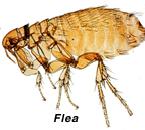
What are fleas?
Fleas are very small wingless insects that feed on the blood of animals. They have flat bodies and long legs that make them perfect for jumping great lengths and quickly moving through fur.
Flea Life Cycle
A flea lays eggs on the host, but these eggs tend to fall off into the environment. They eventually hatch out as larvae. The larvae like to live in dark places such as carpets and crevices where they feed on flea feces (called “flea dirt”). Eventually the larvae form a cocoon called a pupa. They can stay dormant in this stage for months until conditions are perfect for them to hatch into adults. Fleas thrive in warm and moist conditions, which is why we tend to see outbreaks in spring and autumn.
Once an adult flea hatches, it has one week to find a host to feed off of. When it jumps onto the host, it take its first meal within 30 minutes, and will start producing eggs within 24 hours of its first meal. Typically fleas live 30 to 90 days but can live longer under ideal conditions. In total, a flea’s entire life cycle can range anywhere from two months to one year. 
What are signs my pets have fleas?
Flea bites can cause intense itchiness to the point where your pet may be excessively scratching or even chewing at itself. Typically fleas like to spend time around your pet’s lower back/base of tail area, inside the thighs, on the belly and on the neck. In more severe infestations, you may actually see fleas on your pet.
Some animals can have allergies to flea bites. This can cause even worse signs like hair loss, inflammation and ulceration of the skin and lethargy. This is called Flea Allergy Dermatitis. Animals with Flea Allergy Dermatitis should be on regular flea prevention as even one bite can cause a severe reaction.
Animals with severe infestations, especially kittens and puppies, can lose a significant amount of blood and become extremely weak due to anemia.
How would my pets get fleas?
Fleas are very common in the environment. Your pet can be exposed to fleas by being around other animals with fleas or even spending time in an area where flea infested animals may have been (including wildlife). Fleas can also hitch a ride on humans into a house, so even indoor pets can be exposed. It only takes one flea to begin an infestation.
How do I prevent my pets from getting fleas?
We recommend all dogs be on flea prevention medications available from your veterinarian from spring to winter (this is often a combination product with heartworm and intestinal worm prevention). This is the best way to prevent fleas from becoming an issue. Cats that go outside or live with other animals that spend time outdoors should also be on regular flea prevention.
How do I treat my pets if they get fleas?
There are many flea treatment options available for your pet. Here at Coventry Animal Hospital, we believe products available through your veterinarian are the safest and most effective to use for your pet and to be used around your family.
Here are some reasons why we don’t recommend the following products:
Flea Collars:
While flea collars can be effective in some cases, we have seen a number of animals with bad skin reactions and fur loss due to the collars. Furthermore, we have seen many pets with fleas while wearing a flea collar. Pets have fleas while wearing the flea collar. Some products may also lose their effectiveness when they become wet. Often times in our experience, the collars tend to only kill fleas around the collar.
Topical Flea Medications from Pet Stores:
We never recommend store bought topical medications to be used on cats. Some of these products, specifically the ones meant for dogs, can be extremely toxic and fatal if applied on cats. Every year a startling number of cats will die because of improper use of these products. For dogs, we have seen these products fail many times or only provide a very short duration of action. Furthermore, unlike veterinary products, these companies do not offer any guarantees as to the effectiveness of their products.
Flea baths:
Flea baths do not offer residual protection so you would most likely have to bathe your pet more than once. They will not take care of fleas in the environment; therefore you would have to spray your home with flea spray, which is undesirable as all family members need to evacuate the house first.
Treat all pets in Household:
When fleas are noticed on one pet in the house, then all pets that come into the house should be treated with prevention for three consecutive months to break the flea life cycle. This is important as fleas can live in the pet’s environment and jump onto the other pets.
Why Flea Medications from Your Veterinarian are the Best Choice:
For the above reasons, Coventry Animal Hospital, recommends using medications from your veterinarian. These medications are safe and effective. Talking with a member of your veterinary team will allow him/her to choose a product that is suited to the specific needs of your pet. Using these products alone is often enough to clear fleas out of your house, as well as eliminating the need for flea sprays. The companies we work with stand behind the quality of their products and guarantee they will work when used properly. These products often have superior pest control, are easy to use and are the safest option for both your pet and your family.

